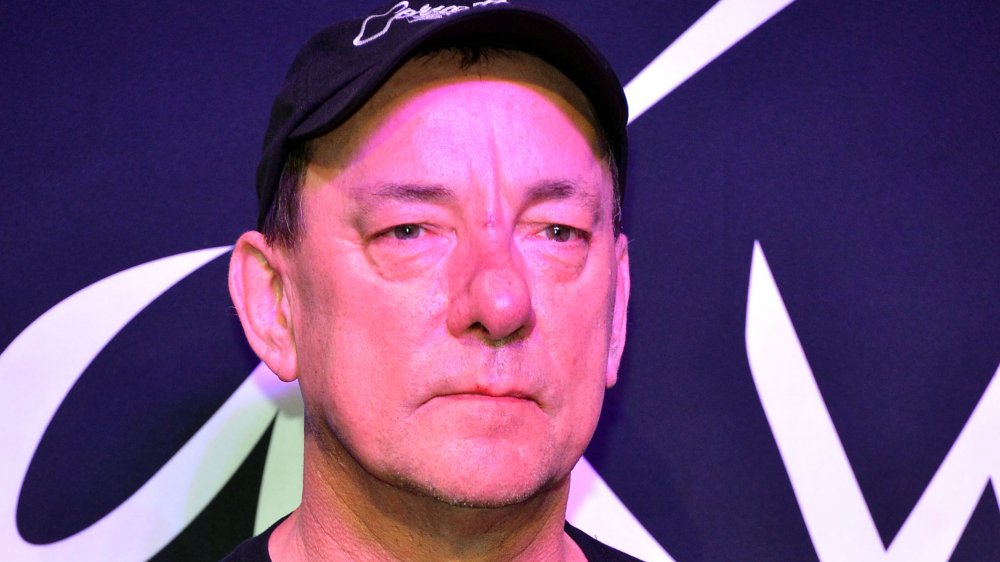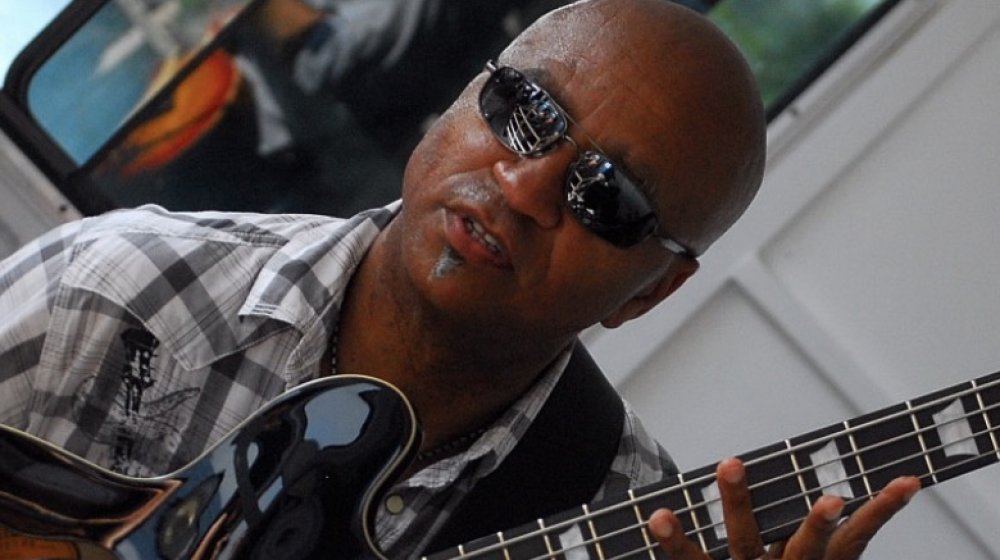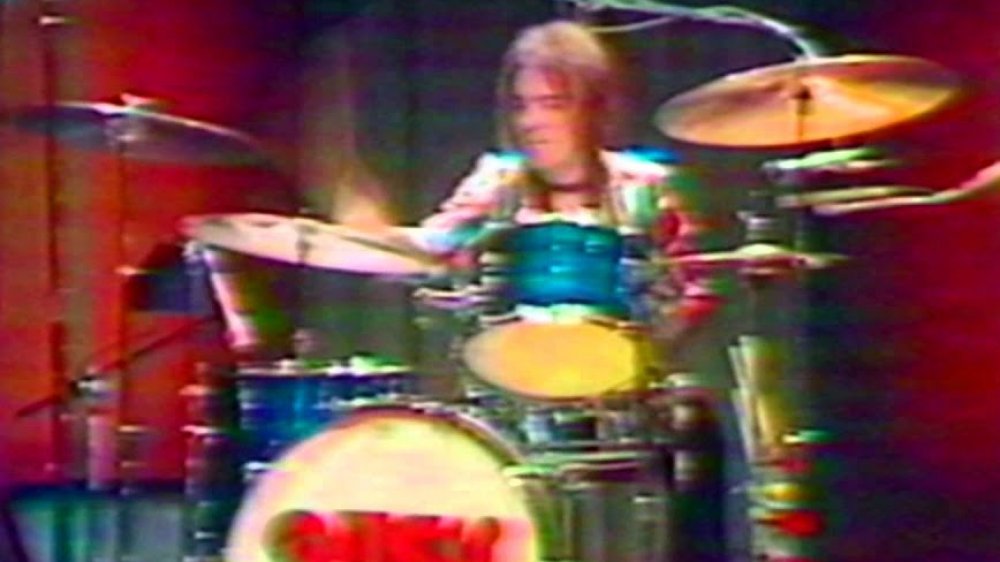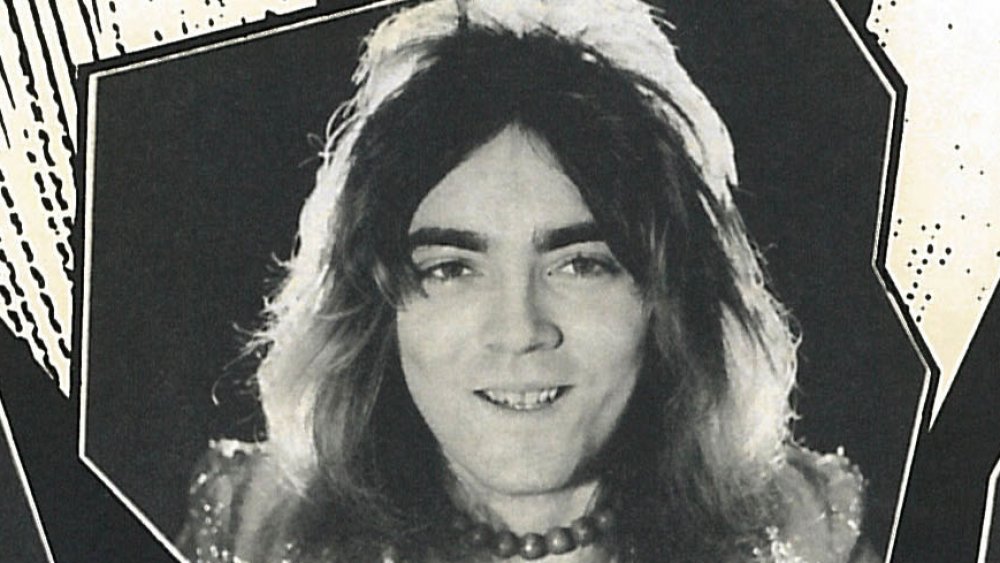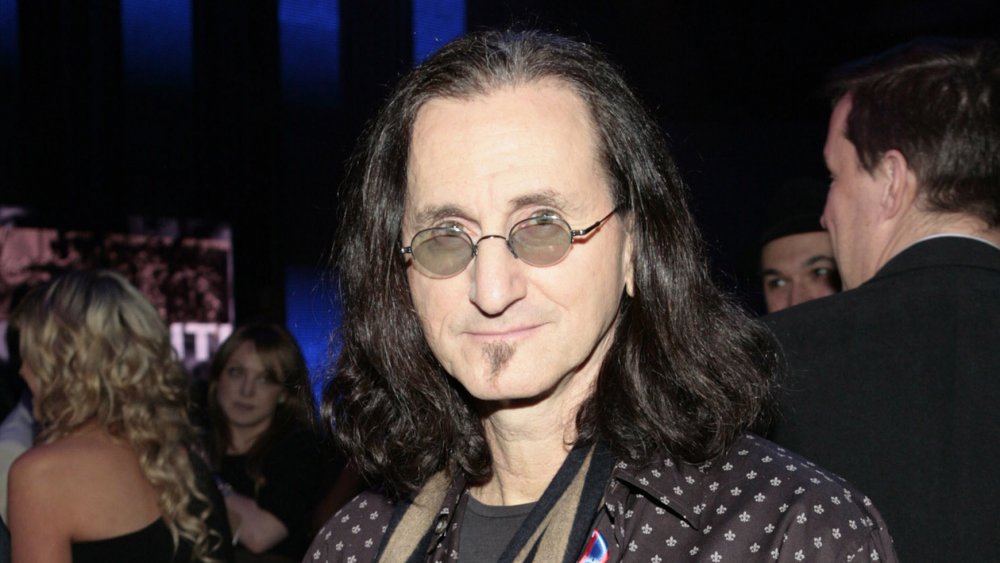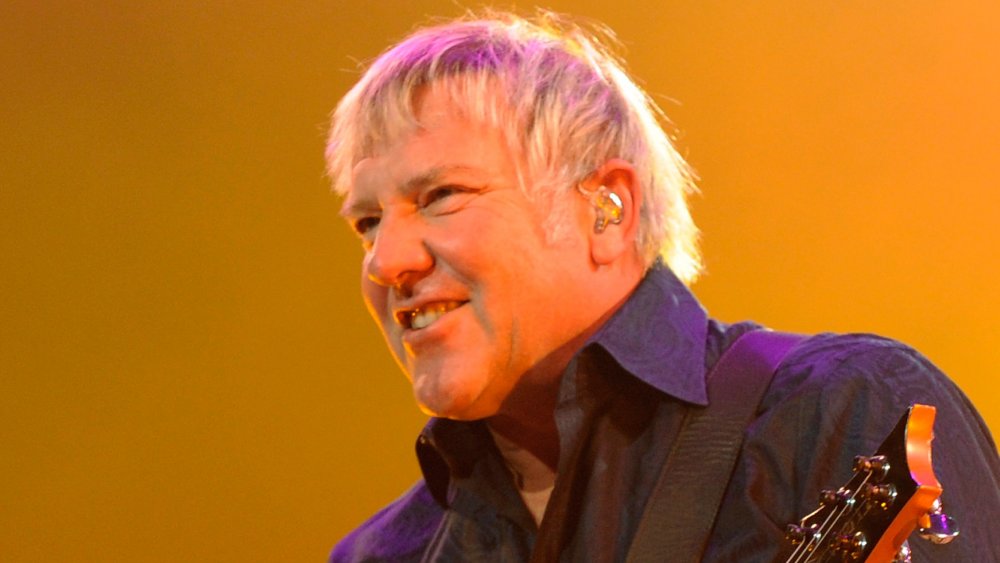The Tragic Real-Life Story Of Rush
A rock band needs exactly three things to make it in this world: monster guitar riffs, a lead singer who can wail, and a drummer who mercilessly pounds away. The Canadian power trio who made up Rush easily checked all of those boxes. Over the span of nearly 50 years, Rush inspired one of the most devoted and vigilant fanbases in music, selling tens of millions of copies of its enveloping, '70s and '80s classics like Permanent Waves, 2112, and Hemispheres. Rush's music can be dense and experimental progressive rock — many of its songs are about philosophy or sci-fi worlds — but it can also be more traditional, as evidenced by how no classic rock station in the world goes very long without playing "Tom Sawyer," "Limelight," "Fly by Night," or "Freewill."
Rush's songs speak to the mind and the heart, the aim of most legit musicians. The band also sings from a place of empathy, as its individual members have endured a lot of pain and struggle over the years. See, despite all their talent and their claim to musical fame, the band members have gone through some devastating times. From family deaths to personal connections to historical tragedies, here's the tragic real-life story of Rush.
Neil Peart's daughter died in a car accident
From late 1996 to July 1997, Rush toured in support of its album Test for Echo. And after the final stop in Ottawa, Ontario, drummer Neil Peart headed home to Toronto to see Selena Taylor, his 19-year-old (and, at the time, only) daughter, off to college.
On the morning of August 10, 1997, Peart hopped on his motorcycle to guide car-driving Taylor "through the back roads of Quebec to a gas station in Hawkesbury, Ontario," as Peart wrote in Ghost Rider: Travels on the Healing Road. And then, as he explained, "Once again I hugged and kissed her and told her I loved and was proud of her. Now I was so glad those words had been spoken." That's because later that day, Taylor died after being involved in a single-car accident. According to MTV News, Taylor's Jeep rolled over on Highway 401, somewhere between Toronto and Montreal, and killed the driver.
Neil Peart's longtime companion had a swift and deadly sickness
Jackie Taylor, the mother of Neil Peart's daughter and his partner of more than two decades, was understandably devastated and depressed by the death of Selena Taylor. "She just wanted to die," Peart wrote in Ghost Rider: Travels on the Healing Road. "She had to be coaxed into eating anything at all, and talked of suicide constantly," he added, also noting that he never left her alone and kept an eye on her sleeping pills and sedatives.
In January 1998, Peart and Taylor were beginning to emerge from the haze of grief when Taylor started to suffer from a persistent night-time cough and serious back pain. However, it wasn't the result of grief-related stress, as Taylor had presumed. Instead, a doctor diagnosed her with terminal cancer. Just a few months later, Taylor passed away after suffering a series of strokes. This personal tragedy was the second loss of a family member that Peart suffered in less than one calendar year.
Rush broke up because Neil Peart couldn't play
When a lot of legacy musical acts retire, they let their audiences know and stage a final "goodbye" tour so they can cash in before disappearing from the public eye and concert circuit. Rush certainly could've made a bundle from a farewell tour, but that wasn't in the cards. "That period of our life is done," Geddy Lee said on SiriusXM's Trunk Nation (via Consequence of Sound) in 2018. The reason? Neil Peart couldn't play the drums to his own very high standard anymore.
"Neil is retired," Lee went on to explain. "He hasn't just retired from Rush; he's retired from drumming. He's not drumming anymore, and he's living his life. Which is fine." The band's R40 Tour in 2015 wound up being the band's last, and even then, it was very hard for Peart to get through, owing to tendinitis, shoulder pain, and a serious foot infection. "Neil was struggling throughout that tour to play at his peak, because of physical ailments and other things that were going on with him," Lee explained. "And he did not want to go out and do anything less than what people expected of him."
Neil Peart died of brain cancer
While not an original member of Rush, Neil Peart played a huge part in forging the band's identity. Not only was he responsible for 40-plus years of superhuman proficiency and clever drum technique, he also wrote the majority of the band's intellectual and philosophical lyrics. But sadly, health issues forced Peart to quit the band after its 2015 tour, and while Geddy Lee and Alex Lifeson discussed teaming up for some musical project down the line, it just wouldn't and couldn't be Rush without Peart.
Andnow, there shall never be a full Rush reunion. On January 7, 2020, Peart passed away at the age of 67. A spokesman for Peart's family confirmed the news to Rolling Stone, as well as revealing that Peart had been quietly fighting brain cancer for several years. "Our friend, soul brother, and band mate of over 45 years, Neil, has lost his incredibly brave three-and-a-half-year battle with brain cancer," Rush wrote on its Instagram page.
Rush's first bassist and singer missed out
Before it was filling arenas with epic jams, Rush was a humble garage band. In 1968, guitarist Alex Lifeson and drummer John Rutsey formed the Projection, and they soon brought in bassist and lead singer Jeff Jones. Days before a first gig — playing to an audience of teens in a coffee shop in the basement of a Toronto church — the band took the suggestion of Rutsey's older brother and renamed the band Rush.
However, mere hours before its second show a week later, Jones called Lifeson to let him know he wouldn't be playing with the band that evening because he wanted to go to a party instead. Not wanting to cancel, Lifeson scrambled to replace Jones and decided on a local bassist named Geddy Lee, from whom he occasionally borrowed an amplifier. Lee was amenable to filling in on bass, but he was reluctant to take on singing duties for the band's set list of cover songs. But he took on the gig and kept it ... for about 50 years. As for Jones, he missed out on selling tens of millions of records and entering the Rock and Roll Hall of Fame as a part of one of the biggest bands ever. (He did, however, go on to be in the band Red Rider, which scored a string of rock hits in the 1980s.)
Rush's original drummer left the band
Original Rush drummer John Rutsey stayed with the group for much longer than original bassist Jeff Jones did. The co-founding member helped Rush forge its unique sound, and he played countless early live shows. In the early '70s, the band signed a deal with major label Mercury Records, the imprint of the band's 1974 self-titled, debut album, Rush. Rutsey played on that album (and had his picture printed front and center on the back of the record sleeve), but his time with the group was about to come to an end.
Just before the band embarked on its first American tour, Rutsey left the group for health reasons, according to Variety, a claim that was backed up by Rush manager Vic Wilson in the documentary Beyond the Lighted Stage (via Ultimate Classic Rock). However, a shift from blues-influenced rock to progressive rock on Rush's next album, Fly by Night, indicated that Rutsey's style of drumming wasn't meshing with the rest of the band's sound. "Alex [Lifeson] and I had been going in that direction," Geddy Lee told Matt Pinfield in a 2003 interview. Lee noted the introduction to the Fly by Night track "Anthem," saying, "I remember jamming it with John, and he wasn't really into playing like that because that required a real active drummer, and he was a real 'lay down the backbeat' kinda drummer." Rutsey was ultimately replaced with the frenetic Neil Peart, and he went on to live a relatively quiet life.
John Rutsey died from diabetes complications
John Rutsey was the first original member to leave Rush, and sadly, he was also the first to pass away. In 1974, he reportedly left the band in part due to vaguely defined "health reasons." Although bandmate Geddy Lee disputed that in a 2003 interview, he did acknowledge that Rutsey had been dealing with diabetes for quite some time. The disease can be tricky to manage, with patients injecting themselves with expensive insulin and using fingersticks multiple times a day to measure blood sugar levels. Severe health issues like blindness, limb amputation, and kidney failure can result over time, and that's what happened to Rutsey.
According to an obituary in the Toronto Star (via Billboard) published at the time of the drummer's death in 2008, Rutsey died from "complications from his lifelong affliction with diabetes" and asked that donations be made in his memory to the Juvenile Diabetes Research Foundation. Reportedly a fitness enthusiast, his exercise regimen wasn't enough to overcome the ravages of diabetes, and Rutsey was just 55 when he died.
Rush's connection to the Holocaust
Rush bassist Geddy Lee is one of Canada's finest, born in Toronto in 1953. His parents, Morris Weinrib and Manya Rubenstein, were relatively recent immigrants to the Great White North, both originally from Poland. "My mother was born in Warsaw and moved to a small town about an hour south called Stachowice, and my father was from a town — I don't know how the English version of it would be, but he called it Ostrowce," Lee told New York's Q104.3 (via Ultimate-Guitar). The pair met and fell for each other in 1939 — and as this was Poland under World War II-era Nazi occupation and they were Jewish, that meeting occurred in a work camp.
Neither was older than 13, and they were both sent to the notorious Auschwitz concentration camp, where they endured unbelievable horrors for close to two years. Then Weinrib was transferred to Dachau, while Rubenstein (along with her sister and mother) remained at Auschwitz before being sent to Bergen-Belsen. After the Allied liberation of the camps, Weinrib set out in search of Rubenstein, eventually finding her at a displaced persons camp and marrying her before moving to Canada.
Lee's mother often spoke about life during wartime. "My earliest memories were my mother talking about Hitler and about what had happened to her family," Lee said. His father, however "was not a big talker" about his time in the concentration camps and passed away when Lee was only 12 years old.
Alex Lifeson had a drunken altercation with police
According to the Naples Daily News (via BraveWords), jazz singer Freddy Cole was performing at a $325-a-plate New Year's Eve party at the Ritz-Carlton in Naples, Florida, in 2003. While singing one of his jazzy love songs, a seemingly intoxicated man jumped on to stage, gyrated around, grabbed the microphone, and asked the audience for "a nice round of applause for this Count Basie." Before his mic was cut, the man was joined in his antics by another individual.
It turns out the guys were Justin Zivojinovich and his father, Rush guitarist Alex Lifeson. According to Courthouse News Service, the Ritz's manager on duty called the front desk to summon the police. Three deputies soon arrived and tried to escort Zivojinovich out of the hotel, but he resisted, leading the authorities to wrestle him to the ground and stick him with a Taser. As Lifeson tried to protect his son, one of the deputies punched the guitarist in the face and broke his nose. Both father and son were arrested and charged with resisting arrest. The duo later sued the police for use of excessive force.
Rush didn't get much respect from the music industry
While it's certainly not as tragic as the loss of life, Rush's years-long struggle to get respect from the rock 'n' roll mainstream is certainly puzzling and undeserved. Multiple critics writing for Rolling Stone, the publication of record for rock music for much of the 20th century, likened Geddy Lee's voice (via Power Windows) to a "dog-calling falsetto shriek" that "float[s] through the songs like swamp gas." "They didn't like us at all at Rolling Stone," Alex Lifeson told Radio.com (via Nola.com) in 2014. "In fact, I think it sort of bordered on hate. They were a 'hip' crowd from an early generation."
Rolling Stone publisher Jann Wenner also headed up the Rock and Roll Hall of Fame, and despite being eligible for years and being one of the most successful acts ever, Rush just couldn't get enshrined. Finally, in 2013, Rush made it in. "When we were nominated, it came as a bit of a surprise to us, because we thought we wouldn't get inducted unless it was over Jann Wenner's dead body," Lifeson said. "But he was still quite alive."


